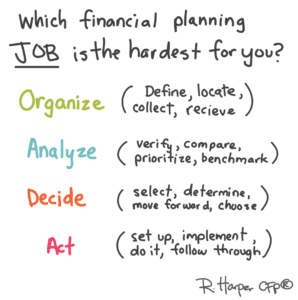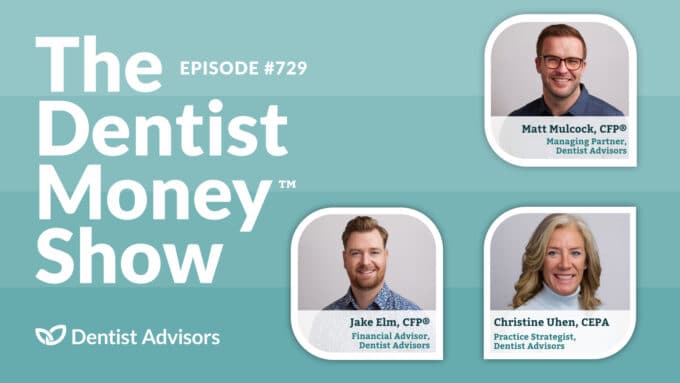Executive Summary
Instead of solving a whole problem, most of us tend to fix little bits and pieces. In the end, we never get the best results that can only come through a comprehensive, holistic approach.
I was guilty of the “bits and pieces approach” to my health—then I hired a personal trainer who helped me uncover a holistic path to more complete conditioning that included nutrition, sleep, hydration, and adding more variety to my workouts. By tackling the whole job, I finally saw the results I had been hoping for.
Achieving financial wellness isn’t much different. You need a comprehensive treatment plan for your money. That plan must address personal budgeting, insurance, investments, taxes, estate planning, debt reduction, real estate, and other factors to see the results that you want.
Beasting It Up
Exercise has always been a challenge for me. I knew I was supposed to do it, but I always felt like I wasn’t making as much progress as I should. I prefer hitting the mountains over hitting the gym. I love gliding through the trees on fresh powder or flying down the mountain on a pine-needle-covered, single-track trail.
But as my business grew, my work and travel schedule became more demanding, and my health started to fade. My weight, blood health, and overall conditioning were definitely in a Bear Market.
I hoped more exercise would do the trick, so I started pushing a little harder. But the pressures of raising four kids, growing my company, and meeting the expectations of shareholders got more intense and I just couldn’t get the results I wanted. I was frustrated and didn’t have enough knowledge to fix the problem.
Even though I knew a trainer would give me the accountability and education I was missing, I felt hesitant to spend money on what seemed like something that only “rich people” could afford. But almost immediately after hiring one, I felt stupid for not reaching out sooner. My trainer was able to objectively and holistically create a master plan, and I was able to stay accountable to that plan. Within a few months, I saw results that I had been trying to get for years.
The outcome was much more comprehensive than what I could have achieved on my own. And it saved me a ton of time. I lost a lot of weight, decreased my body fat, improved my conditioning, lowered my stress level, and strengthened my body. My ability to manage my business also improved. And my relationships with my wife, kids, and employees were all much healthier. Bottom line—the trainer was just better at seeing the big picture.
Mastering the “Big Picture”
Most of us try to tackle parts of a problem, but we’re reluctant to tackle the whole problem. The whole problem takes a lot of time and a lot of experience. But getting the real results we crave requires a comprehensive approach. For my health, I was falling into a trap called “narrow-framing.” It’s a common tendency in behavioral psychology where people focus on one small area assuming that it’s the “problem.” They mistakenly assume that by completing the small problem, it’s going to solve the bigger one.

Financial planning is about following a comprehensive treatment plan for your money. It’s about looking at personal budgeting, insurance, investments, taxes, estate planning, debt reduction, real estate, and several other factors. Holistic financial planning is not generic. It’s a very precise, detailed treatment. Dave Ramsey is a good dude and I respect most of the advice he gives, but “Debt is Dumb” just won’t do for dentists.
“Hey, you should get out of debt! I would go crazy if I had that much debt.” Uhhhh, thanks, well-intentioned father-in-law. Do you have any idea what it’s like to have $500,000 of student loan debt? Or, if you’re a practice owner, “Do you have any idea what it’s like to have millions of dollars of practice, equipment, and real estate debt just to get this thing off the ground?” And what if you want to live a decent life along the way? Like maybe afford a vacation or two?
Financial planning is about getting much more specific. In the debt example, there’s going to be a very specific debt-to-income ratio that you need to hit so you can balance living in the moment and paying off debt at an efficient pace. And it’s also specific to your income, zip code, and career goals.
All-or-nothing thinking or generic platitudes that work for the general population just won’t cut it for dentists. That’s why a treatment plan for finances really needs to be unique to the occupation of the individual person. The personal trainer I hired specialized in working with busy CEOs, and consequently, his treatment plan dialed into my specific challenges. And it’s why Dentist Advisors only works with dentists—so we can effectively focus on creating a holistic and complete treatment plan for you.
For You, It’s About Wealth Not Health
My health problem was much bigger than exercise. Nutrition and food consumption, sleep patterns, hydration, the intensity and variety of my workout habits; they were all part of the big picture I was failing to conquer. I wasn’t tackling the problem in a comprehensive way. But once I incorporated all of the related issues to “wellness,” the dominos started to fall and I noticed a significant improvement in my weight, my strength and conditioning, and my energy levels.
Achieving financial health is more than just investing money. It’s a combination of several issues that collectively result in faster net worth growth, more liquidity, less stress, and more financial freedom.
Holistic financial planning is making smart financial decisions in all areas of your finances, as quickly as possible. And as your wealth grows, there will be an increasingly large list of “decisions” to make. Miss one or two key areas, and you’ll be shortchanging your financial wellness. I could go through literally hundreds and hundreds of individual little tasks or small jobs that need to be done to arrive at holistic financial health.
Let’s just take the example of debt that came up earlier. Some of the tasks you’ll need to complete are organizational (get updated copies of amortization schedules for review); some are analytical (compare all current terms and interest rates to offers from other banks); some are decision-making tasks (picking which bank makes sense); some are activity driven (fill out a bunch of paperwork and interact with the bank to make sure this thing gets done correctly).
If you look at the hundreds of little activities, you’ll see that many of them fall into this type of pattern: Organize → Analyze → Decide → Act.
You Can’t Skip a Step
Going through any action step will give you a feeling of progress—after all, most people just want the “act” stuff done. We even get a little more dopamine from that last step, and consequently many of us skip the organize, analyze and decide steps. Kind of like teaching my kids about math—“just give me the answer Dad!”
Too many people are “investing money,” “setting up retirement accounts,” “paying down debt,” and still not seeing results. Even though they’re doing some of the jobs, they feel their financial situation is just not progressing at the pace they want. It’s taking too much of their time to get average or below average results.
Unlike physical fitness, you can’t see the spare tire of financial unwellness gradually accumulating over your belt-line. It’s a subtle, subjective issue. One that causes uneasy feelings.
The Power of Accountability
Holistic planning for a dentist is very different than holistic planning for a corporate executive, a general contractor, or even a doctor. An advisor who works with a cross-section of clients from dozens of occupations will not likely understand how to comprehensively treat the needs of a dentist. The more specialized a financial planner becomes, the more they can assist in this process. And, the more holistic and effective they can be with their financial treatment plan.
For many of the same reasons I use a personal trainer for my physical wellness, I strongly recommend that you consider hiring a fee-only fiduciary as your guide, coach, and service provider. It will save you time, which you can re-invest at a higher rate into your practice. It will also allow you to see the big picture and not miss any key areas in your overall financial wellness.
An independent, fee-only advisor who specializes in working with dentists can help you organize, analyze, decide, and act. The right advisor who fits this bill can track all of the painful details that you won’t likely do on your own. Over time, this simply results in a much faster path towards better financial health.
Dentist Advisors is a fee-only, fiduciary advisor. We help dentists make smart decisions as quickly as possible. Our process-driven, holistic approach helps us provide our dentists with a broad view of their entire situation. Book an appointment here to speak with one of our dental-specific financial advisors.





